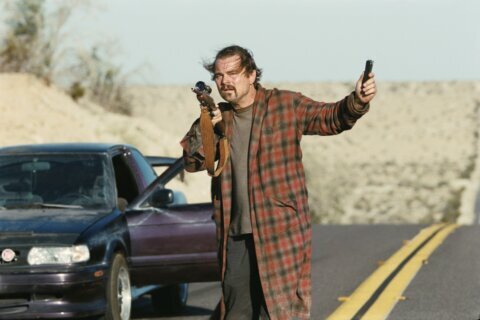Jason Fraley, WTOP film critic
WASHINGTON – Lord, he was born an Amblin man, and his career has been a tale of two directors ever since.
The Steven Spielberg pendulum has repeatedly swung between supernatural fantasy – “Raiders of the Lost Ark” (1981), “E.T.” (1982), “Jurassic Park” (1993) – and gritty war history – “Schindler’s List” (1993), “Saving Private Ryan” (1998), “Munich” (2005).
How fittingly ironic that “Lincoln” hits theaters on the 25th anniversary of “Close Encounters of the Third Kind,” which arrived on this exact date in 1977. Just 130 miles separate Wyoming’s Devil’s Tower from South Dakota’s Mount Rushmore, where the face of our greatest president is carved into the mountainside.
Indeed, Abraham Lincoln was a mountain of a man, and Spielberg’s “Lincoln” is a mountain of a movie. Does it get any better than today’s most famous filmmaker (Spielberg) adapting the best presidential biography of our time (“Team of Rivals” by Doris Kearns Goodwin), starring today’s greatest actor (Daniel Day-Lewis)?
Rather than tackle the entire biography, “Lincoln” screenwriter and Pulitzer Prize-winning playwright Tony Kushner (“Munich”) smartly focuses his script on a small portion of Lincoln’s life. This approach typically works best for biopics, which is why “Walk the Line” (2005) was a slightly better movie than “Ray” (2004), even if Jamie Foxx’s performance was better than Joaquin Phoenix’s.
Here, we specifically follow Lincoln’s quest to pass the 13th amendment, abolishing slavery. The film opens years into the Civil War, after the Emancipation Proclamation (Jan. 1, 1863) and after the Gettysburg Address (Nov. 19, 1863), where Lincoln faces a choice: end the war or abolish slavery.
Taking the politically unpopular route, he tells his fellow Republican cabinet members to consider the two options: “If you could look into the seeds of time, which will grow larger?”
The rest of the movie depicts his one-on-one meetings with individual congressmen, trying to scrounge up enough votes to pass the amendment, combining the war-time leadership of Washington and Roosevelt, the communication skills of Reagan and the martyr idealism of Kennedy.
The fact that Spielberg manages to create a gripping and inspiring tale out of Washington lawmaking is incredible, especially since we already know the ending. Much of the credit belongs to Day-Lewis, who was given the role when Schindler himself, Liam Neeson, dropped out in 2010. Four score and seven years from now, I have a feeling folks will remember “Lincoln” more than “Taken 2” (2012).
Is there any argument that Day-Lewis is the best actor of our time? His role as Lincoln comes after winning an Oscar as Christy Brown in “My Left Foot” (1981), searing the screen as Hawkeye in “The Last of the Mohicans” (1992), earning an Oscar nomination as Gerry Conlon in “In the Name of the Father” (1993), earning another as Bill “The Butcher” Cutting in “Gangs of New York” (2002) and winning his second Oscar as Daniel Plainview in “There Will Be Blood” (2007).
His portrayal of Lincoln could very well win him a third, as I sat staring at the screen, having to pinch myself a few times that this was indeed Day-Lewis and not the living, breathing Lincoln himself.
With all due respect to Henry Fonda in “Young Mr. Lincoln” (1939) and Gregory Peck in “The Blue and the Gray” (1982), Day-Lewis’ performance is the best ever given of Lincoln. So often we see our 16th president as a statuesque figure, staring down on Jimmy Stewart in “Mr. Smith Goes to Washington” (1939). Here, we get to see his human side, rolling on the ground with his children, interacting with his wife in the Lincoln Bedroom and cracking clever jokes to his cabinet members.
This is no mythic legend. This is a great man, in the flesh.
It doesn’t hurt that Day-Lewis has several Oscar winners surrounding him in the supporting cast. Two-time Oscar-winner Sally Field (“Norma Rae,” “Places in the Heart”) plays his wife, Mary Todd Lincoln, mourning the death of her son and keenly aware of her own loony place in the history books. Oscar-winner Tommy Lee Jones (“The Fugitive”) gives his best performance since “No Country for Old Men” (2007) as abolitionist Thaddeus Stevens, U.S. Representative of Pennsylvania.
Rounding out the cast are David Strathairn (“Good Night and Good Luck”) as Secretary of State William Seward, James Spader (“Sex, Lies and Videotape”) as political operative W.N. Bilbo and Joseph Gordon-Levitt (“The Dark Knight Rises”) as Lincoln’s patriotic son.
Each of these historical figures comes to life, thanks to costume designer Joanna Johnston, production designer Rick Carter and cinematographer Janusz Kaminski, who won Oscars for both “Schindler’s List” and “Saving Private Ryan” and last year was nominated for “War Horse” (2011).
Also returning to Spielberg’s filmmaking cabinet is legendary composer John Williams (“Jaws”), whose score both grounds us in the 19th century reality and transcends the screen with the feeling that this solitary life, in the words of Dr. King, is bending the arc of history toward justice.
The weight of each decision is visually expressed by Spielberg, whose camera starts behind Lincoln’s head and swings around to his face. It mirrors how Spielberg started behind Neeson’s head in “Schindler’s List” and how Hitchcock started behind Cary Grant’s head in “Notorious” (1946). Spielberg admits he’s not in the auteur class of Hitchcock, Welles or Scorsese, considering himself a commercial storyteller like Michael Curtiz (“Casablanca”) or Victor Fleming (“Gone With the Wind”).
Still, if you factor in fame, showmanship and pop culture impact, Spielberg’s face deserves a spot on Hollywood’s Mount Rushmore. If Oscar history is any indication, Spielberg will land a Best Director nomination for “Lincoln,” as his two Best Director wins came for “serious works” like “Schindler” and “Private Ryan.” In a way, the specter of Lincoln hung over both of those films, from the theme of freeing a “racially inferior” people from white supremacist bondage in “Schindler,” to General Marshall memorizing a handwritten Lincoln letter in “Private Ryan.”
Spielberg enlists several other clever directorial techniques. He uses the body of Day-Lewis to wipe the frame (i.e. the bathers in “Jaws”). He slowly pushes in on Lincoln, allowing his body to grow larger in the frame as he gradually commands control of the room. And he cleverly cuts from a crying Sally Field saying, “We had to put on a face,” to her fake smile at a dinner party. Still, his greatest credit may be his slow and steady pace, a patience described by Lincoln, who uses a sailing analogy to describe his presidency. He says the key to success is always knowing where “north” is on your moral compass, not charging ahead too fast, while keeping an eye out for potential obstacles.
From start to finish, Spielberg swiftly avoids several potential pitfalls:
1) Exposition. Some Spielberg movies do a little too much “hand holding,” and I feared this would again be the case in an early scene with Sally Field providing exposition. Thankfully, the film does not fall into this trap for the rest of the movie, using nuanced dialogue and complex analogies to get its points across.
Case in point: Lincoln gives his rationale for abolishing slavery by quoting Euclid, “Things which are equal to the same thing are also equal to each other.” This is clearly a director who’s matured since previous attempts on race in “The Color Purple” (1985) and “Amistad” (1997).
2) Predictability. Spielberg also avoids the trap of predictability by delivering a number of moments that go against the grain. Instead of starting the movie with Lincoln delivering the Emancipation Proclamation, the famous speech is instead given by black Union soldiers, who recite the speech back to the president as a way of saying thank you.
Instead of a straight-forward depiction of the assassination at Ford’s Theater, like in “The Birth of a Nation” (1915), Spielberg foreshadows the event mid-way through the film, then shows the actual event through the eyes of his son. Finally, Tommy Lee Jones is given a brilliant twist at the end of the movie that drives home the film’s theme perfectly.
3) Preachiness. Civil War buffs will surely comb over the film for historical accuracy, but my goal was to see whether the film came across as preachy. Quite the contrary.
“Lincoln” puts in its two cents – copper pennies engraved with its hero – without hammering us over the head. While a socially progressive theme pervades the story, there are plenty of references to Lincoln as the father of the Republican Party, making Democrats the butt of several jokes.
To me, it remains one of the bizarre flips in American history that after Lincoln’s assassination and the failure of reconstruction, the two parties managed to flip on the issue of race over the next 100 years, moving from a Republican push for abolition in the 1860s, to a liberal Dr. King and Democrat Lyndon Johnson finally realizing that dream in the 1960s.
In an age of libertarian soul searching, do future flips await?
This fascinating interplay between past, present and future makes “Lincoln” super relevant in our current political context. William Faulkner once said, “The past is never dead, in fact, it’s not even past,” while Mark Twain wrote, “History doesn’t repeat itself, but it does rhyme.”
Here again in 2012 America, Texas lawmakers are once again threatening to secede from the union, while Washington is mired in partisan gridlock. Lincoln’s example of building a “Team of Rivals” by meeting one-on-one with individual congressmen is a blueprint for our current President (Democrat) and Speaker of the House (Republican) to build bridges and pass a landmark piece of legislation.
At a time when many Americans feel disillusioned about our political process, due to a barrage of negative campaign ads, “Lincoln” reminds us of why that process exists in the first place. Our founding fathers created an ingenious system of intentional gridlock to prevent our nation from charging too far in either direction. It’s a system that, under heroic leaders, can produce earth-shaking results.
The same can be said about today’s film industry. The loudest, over-the-top voices garner most of the attention and dollars, be they box office receipts or campaign donations. Yet much of this shock value entertainment recalls the “Game Change” quote by Steve Schmidt, Senior Advisor to the 2008 McCain-Palin campaign: “It wasn’t a campaign. It was a bad reality show.”
Great movies – like great leaders – are patient, nuanced and follow a bold vision that favors the high road over the easy one. These are the movies, the leaders, that earn the votes, get the statues and change our world. Cloaked in immense power and surprising humor, “Lincoln” provides hope that inspired, intelligent filmmaking shall not perish from this earth.
★ ★ ★ ★
The above rating is based on a 4-star scale. Read more from WTOP Film Critic Jason Fraley by clicking “Fraley on Film” under the “Living” tab above, following @JasonFraleyWTOP on Twitter, and checking out his blog, The Film Spectrum.
(Copyright 2012 by WTOP. All Rights Reserved.)








